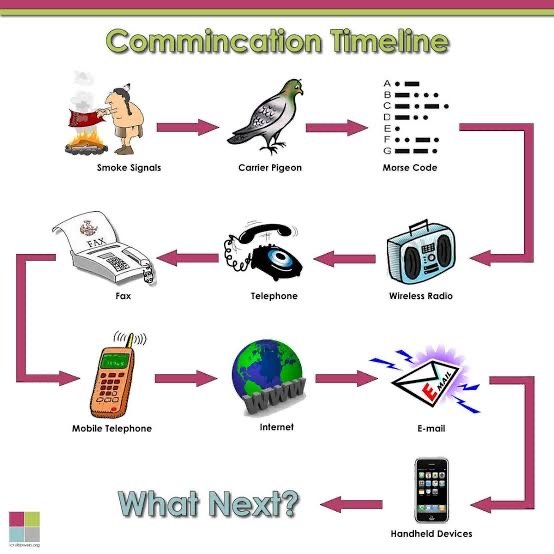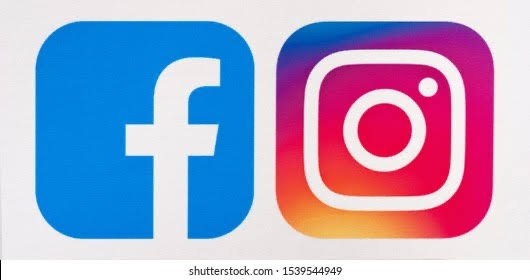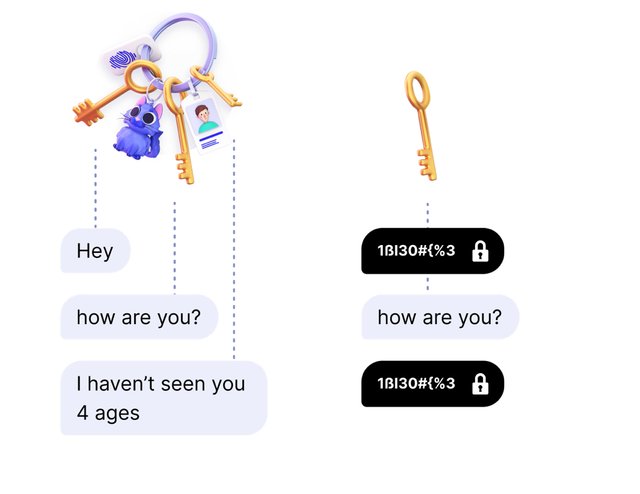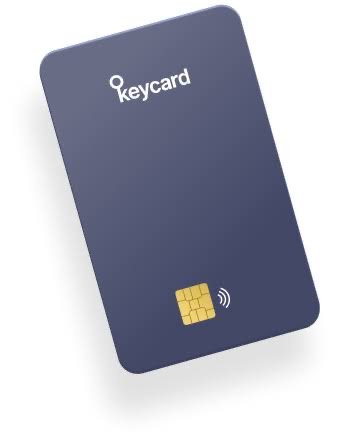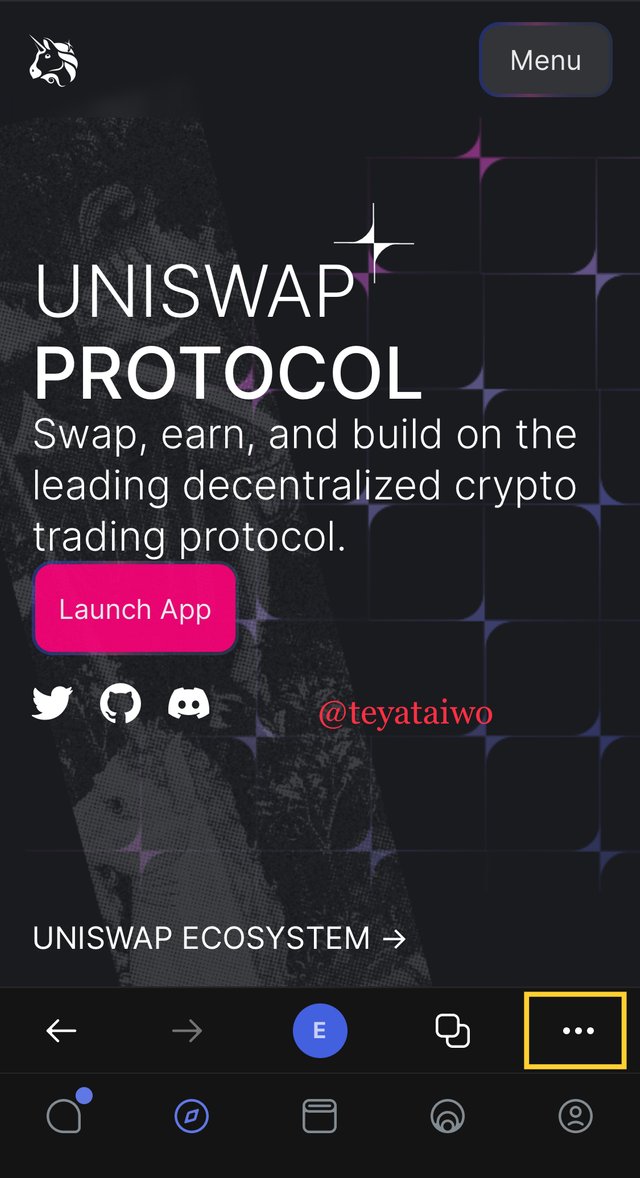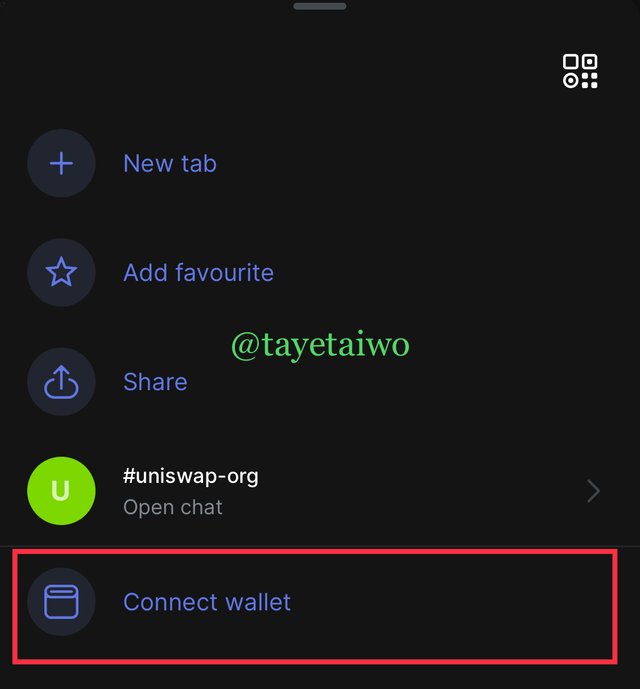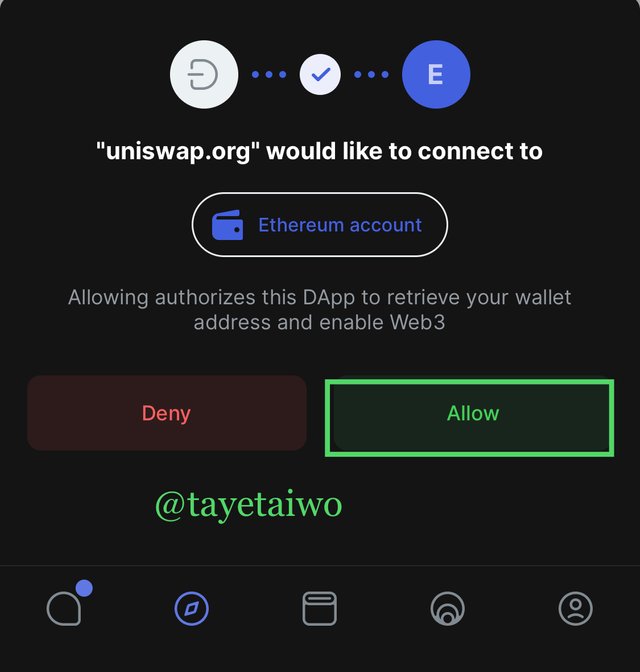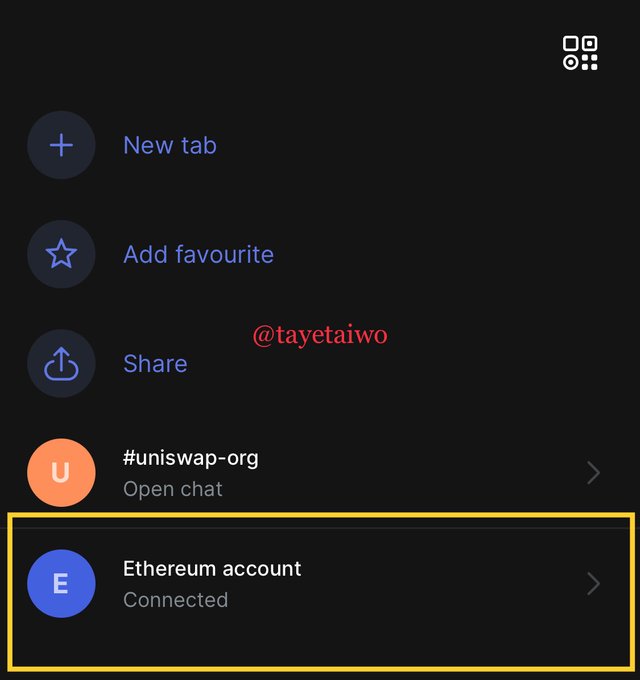Status - P2P Messaging | Crypto Academy / S5W5 | Homework Post for @wahyunahrul.


Give your opinion on the existence of Status on the current messaging app?
Let's t quickly talk about communication and the origin of communication. Communication can be
traced back at the “origin of speech circa 100,000 BCE”, where messages are passed through cave paintings, ideograms, pictograms, and many other different ways. Communication went down to the time where birds are used as a medium in sending message to another person. As the world evolve and technology growing, communication evolved to the point of using “Morse code”, and so many other processes.
Communication evolved down to the use of mail box where messages were passed through mailbox. The mechanism of passing these messages as of the time was through writing letters, this letters after being written down on a hardcopy are sent to the receiver at the receiver's mailbox by a third party (a person).
The letter meant for the receiver at this point in the hands of a third party is likely to be seen and manipulated, and this reduces the level of privacy in the communication process.
Communication grew from this process to the use of social media, where a person can communicate with another in a different place, State or country with the use of a mobile or internet connected device.
The ancient mechanism of communication being a process between two different individuals involving a third-party was also adopted in the present social media applications that are widely used.
Now we can see the evolution in communication up until the point of maintaining maximum privacy between two persons.
In conventional messaging applications, the popular ones used world wide such as; Facebook, Whatsapp, instagram and so on makes use of users details in the creation or registration of an account on their database, this depicts the low level of users privacy in the system.
Just as we all (exposed to mobile technology) know that when registering on most social network applications, some requirements such as your email address, phone number, country, and other information are needed by the system in other to create and register an account for you under their database, this is why most messaging applications are centralized messaging apps.
Looking at the incident that happened on one of the social media messaging applications, WhatsApp, whereby users are requested to upload some information about them, in other to be able to keep using the social media app. This has left people unnerved as privacy has become a crucial concern. After the announcement by the WhatsApp company on the 8th of February 2021 on their new data privacy policy, people being uncomfortable with this privacy bogey had to divert into other messaging applications such as telegram, signal app and others in other to keep their identity and information private.
Now we see how significant privacy can be and how important it is to most businesses, running through and under most conventional messaging applications.
This has lead to the invention and development of a decentralized messaging application built on ETH blockchain known as status.

Status is a secured messaging application developed with art technology, built as a decentralized app by Carl Bennetts and Jarrad Hope who operate on a software distribution company before coming together to invent/develop the status messaging and crypto wallet app.
Status messaging application is programmed as peer-to-peer messaging, where message sent from the sender to the receiver is recorded and stored on the blockchain and can only be seen by the receiver through the use of the private key.
Messages sent on status app are dispersed all over the block and validated by a node, but the only person who is able to decrypt this dispersed message by the sender is the receiver who has the private key to the account where the message is sent. That is why it is called peer-to-peer messaging, and also because their is no third party involved in making sure the message is delivered, unlike the conventional messaging apps.
The process where the messages are dispersed all over the block is to make sure that sent messages remain unaltered and cannot be manipulated by anyone.
In conventional messaging apps, messages sent from a user to another requires a third party in other for the message to be delivered, this is unlike the status messaging app.
SMA (status messaging application) consist of some unique features which are important in the evolved world of cryptocurrencies, where users can store their crypto assets as well and also access the web3 page for quick access to the Defi space and other dApps applications.
So with this following point on SMA in comparison with the conventional system of message, I would say that the decentralized messaging app has impacted greatly in our modern days where people wants to remain anonymous and keep their privacy.
In creation or registration of an account under the status messaging app, there is no room for addition of personal details such as email, phone number, and all that, rather, what you only need is a mobile device and the internet to create an account. This is another reason to show its level of decentralization. Even the steemit platform requires an email and a phone number.
The existence of status has enlightened people to know that their privacy matters and that it can be achieved, it has given people who want to remain anonymous and doesn't want to share their details with any application a huge opportunity to explore and enjoy the decentralized messaging system.

What is the message delivery mechanism used in Status? Give a complete explanation along with illustrations with pictures
The delivery message mechanism adopted in the decentralized messaging application, “status” uses a Peer-to-peer-messaging system or person to person messaging (P2P).
The P2P messaging system of communication is a profess where two or more individuals communicate or exchange information through texting, in a secured means without the infusion of an intermediary.
In convectional messaging mechanism, messages are sent/disperserd to a person through the messaging Application inventor. Here, the app inventor works as the third party to the message sent, leaving the message content exposed to another person whom it was not meant for.
This is a different feature and attributes when it comes to P2P messaging application. In status messaging app, the message sent goes directly to the reciever without the need of a third party or an intermediary to deliver the sent message, protecting the content of the message from another person or a third party (invisible to anyone), including the developer/creator.
Now let's explain the message delivery strategy on status. When a a message is written and sent, the message sent is converted from a readable and understandable text to an unreadable code which can't be understood through encryption process.
The message sent is dispersed across the entire blockchain network system. This is unlike the conventional messaging system Which are centralized.
Messages are sent with the aid of a third-party in a centralized messaging app, whereas in status application(Decentralized) the message sent is broadcasted across the whole network.
Although messages are dispersed across the entire network, the only person who can decode or decrypt the broadcasted message is the user with the private key.
The private key serves as a medium to access and read the content of the message, and this means that only the sender and the receiver who possess the private key can see, read and understand the message dispersed.
After the message has been dispersed across the blockchain, It is recorded by a node responsible for recording all messages sent across the blockchain in the system. Then, the receiver of the message who has the private key uses it to decrypt the message from the unreadable code pattern which cant be understood and read to a readable and understandable format/pattern.
The content of the message is revealed to the receiver. This is so in other to prevent anyone, even the creators of the application from tampering/manipulation or accessing the message.
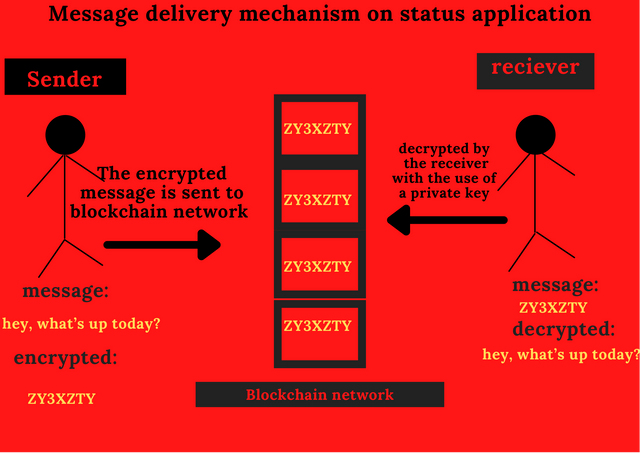
The image shown above is a complete illustration of message delivery process on status platform. From this image we would see that the sender writes and sends a message "Hey, what’s up today?” The message was encrypted and dispersed across the blockchain system as an unreadable text “ZY3XZTY”. The dispersed and encrypted message is now being decrypted/decoded by the receiver through the use of a private key into a readable and understandable text “Hey, what’s up today?”.

What distinguishes the Key Cards offered by Status with Hardwallet in general? What's unique about it?
The Key card and the hardware wallet are both an offline wallet which stores the private key of a particular cryptocurrency account. Despite Their similarities in terms of storage, the Keycard has a unique feature which makes it different from the hardwallet.
This comprises the fact that keycard makes use of NFC technology while the hardwallet doesn’t. The Keycard is made of plastic just like our ATM cards built with NFC technology for contactless transactions.
The word “NFC” is an acronym for Near Field Communication, its technology permits wireless transfers among devices at a very close range.
ThIs NFC technology adopted in status messaging platform grants the keycard the permission to be stuck to the back of a mobile phone(with access to the internet), tablet or computer which validated the transactions performed on status platform.
The unique feature of this keycard is that it doesn’t require insertion into a smartphone or a computer device before the authentication of transactions, just like in the case of hardwallet.
This is unique in the sense that users need not to be scared of computer viruses or system malware. Also that the private key In the keycard does not exit from the card during transaction authentication as it is in most hardware wallets.

Show the steps to create an account on Status in full. (Screenshot required).
- STEP I
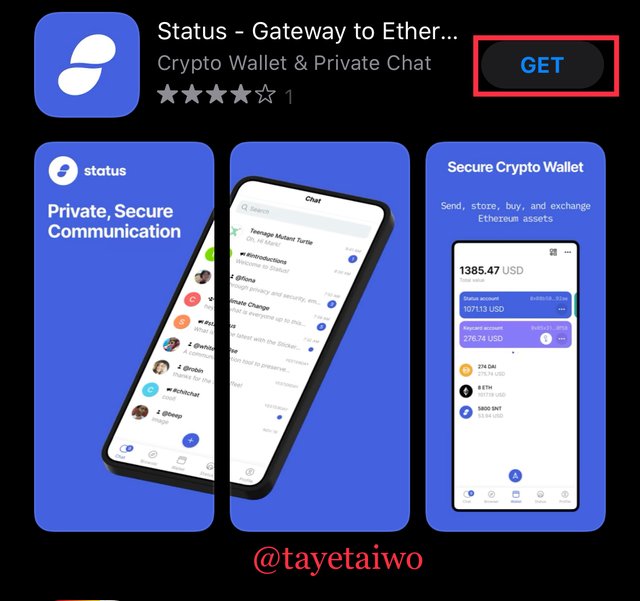
First, download and open your status application through play store or apple store for android and IOS users respectively.
- STEP II
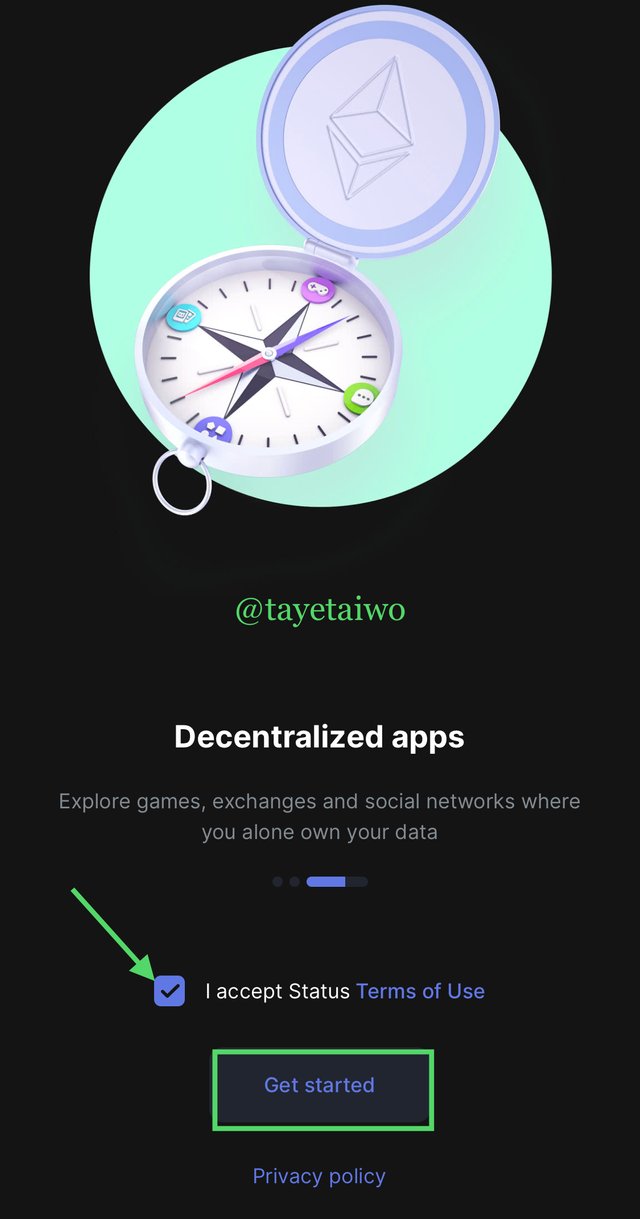
Next, click on the little box indicated by a green arrow which says “I accept status terms of use”, then click on get started
- STEP III
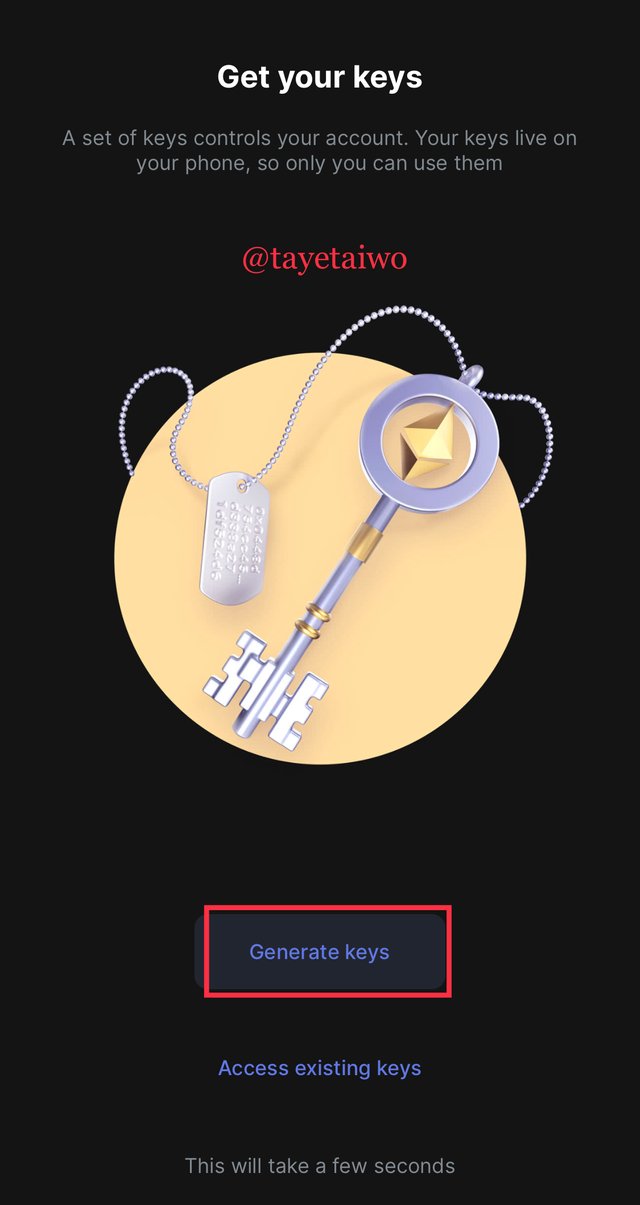
Next, you would be directed to a page where you would be asked to generate your keys or access an existing key, click on generate keys
- STEP IV
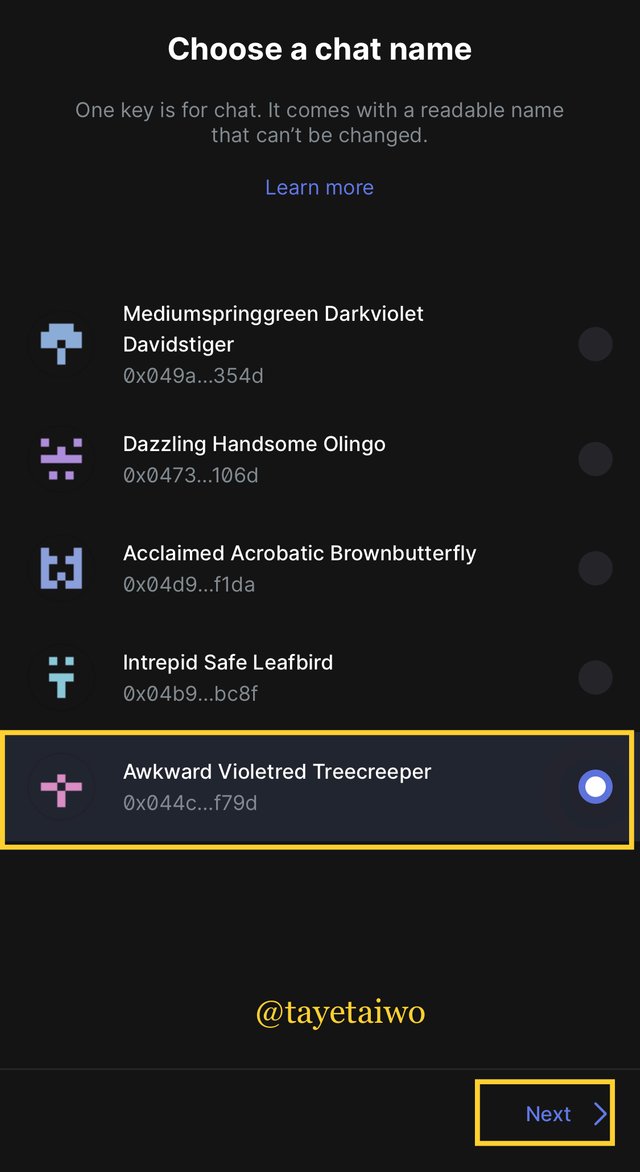
- STEP V
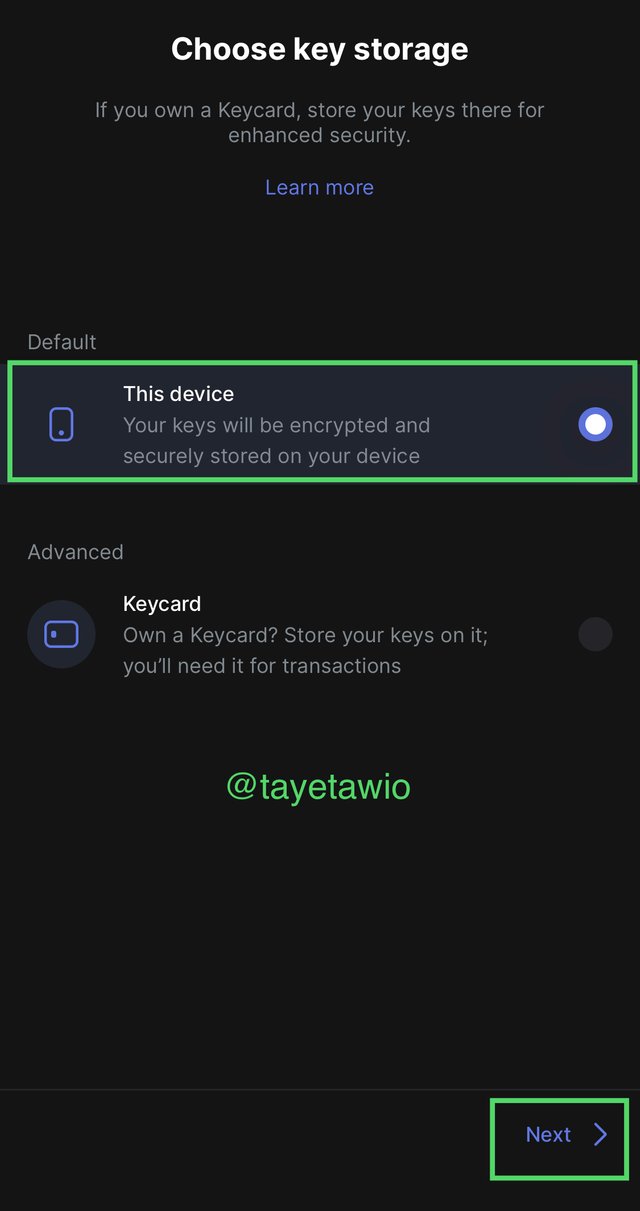
- STEP VI
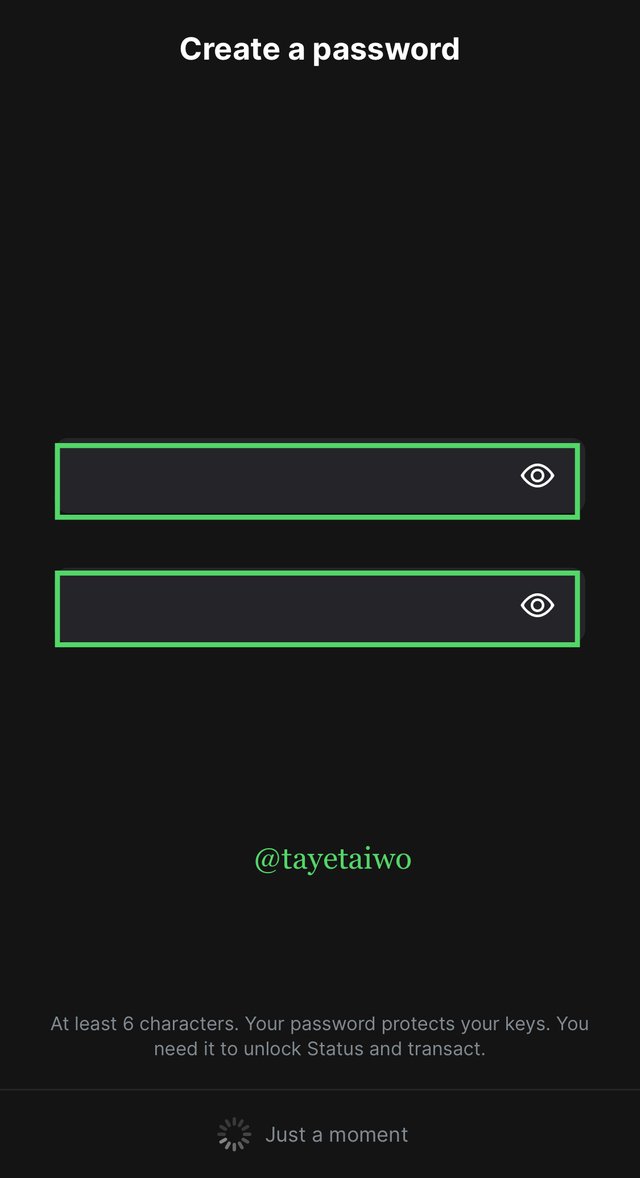
You are required to enter the password in the first box and re-enter it in the second box making sure that the match in other to proceed, then click on next.
STEP VII
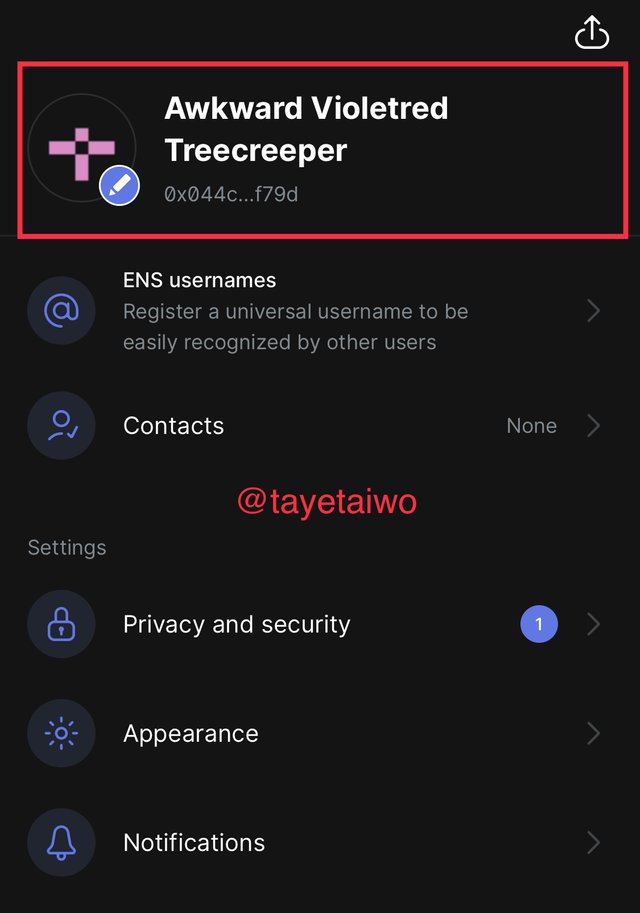
My account has been successfully created, as we can see, the chat name I choose is being displayed on my profile dashboard.

Show the steps for backing up recovery phrases for a complete Status account. (Screenshot required).
- STEP I
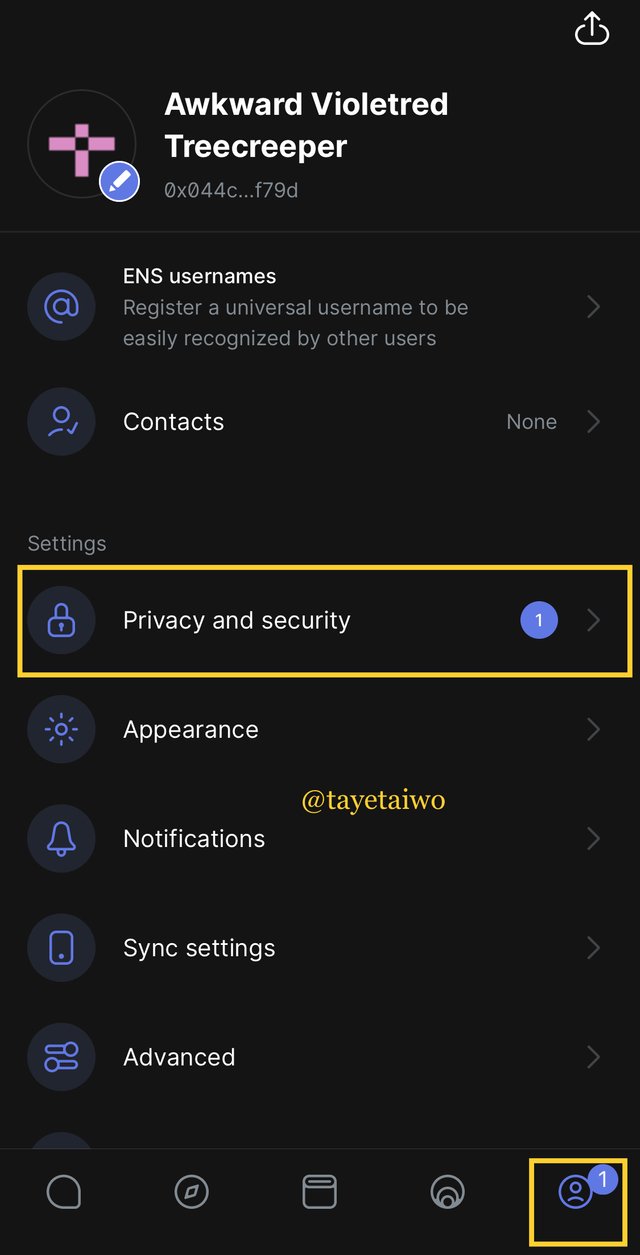
- STEP II
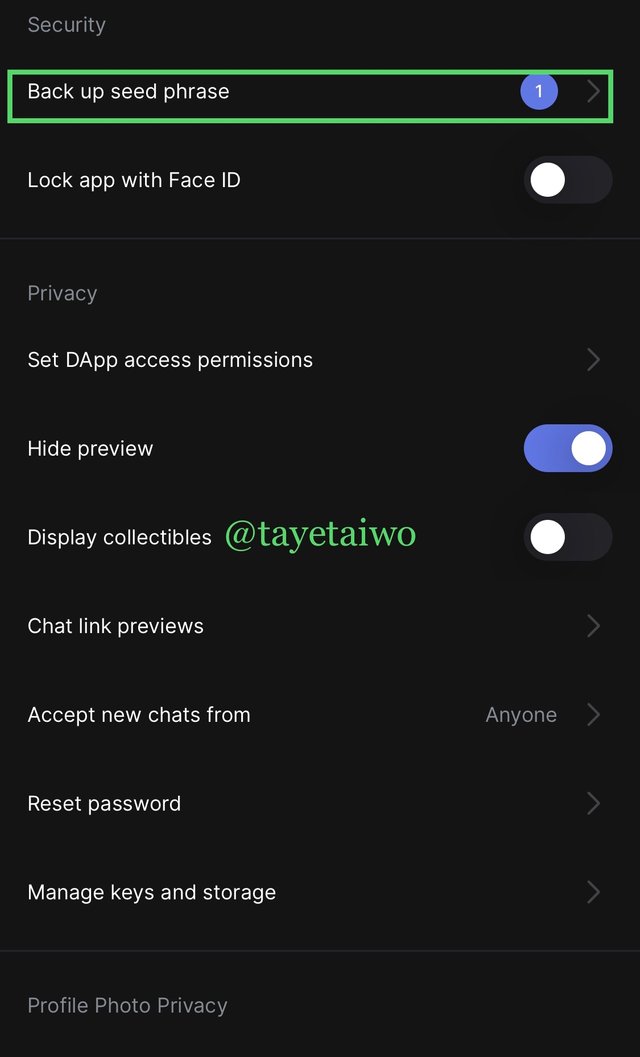
- STEP III
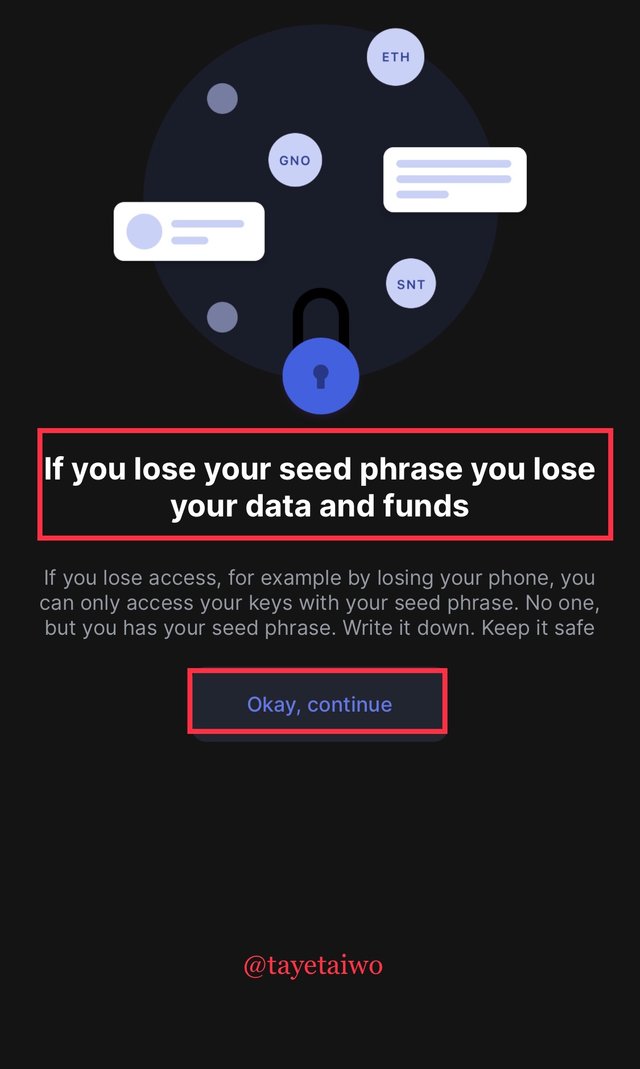
- STEP IV
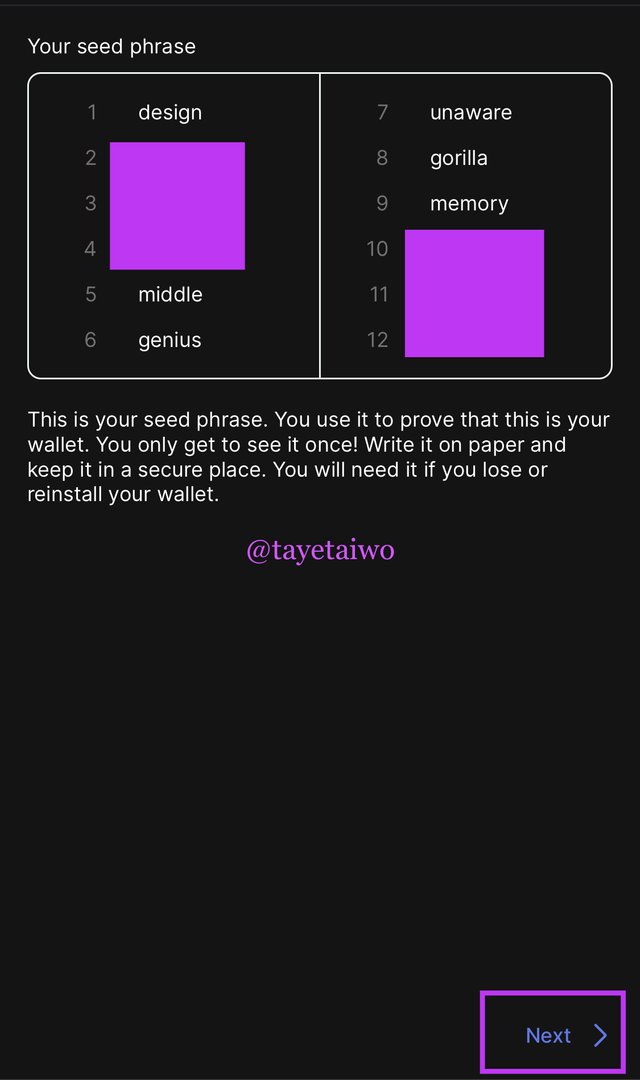
You would be shown your seed phrase. This phrase is what you would use in other to proof that the account belongs to you. Write down this phrases and keep it in a safe place because It could only be seen once, and you would need it as well, Incase of lose or reinstalling of Wallet. After writing it down, click on “next”.
STEP V
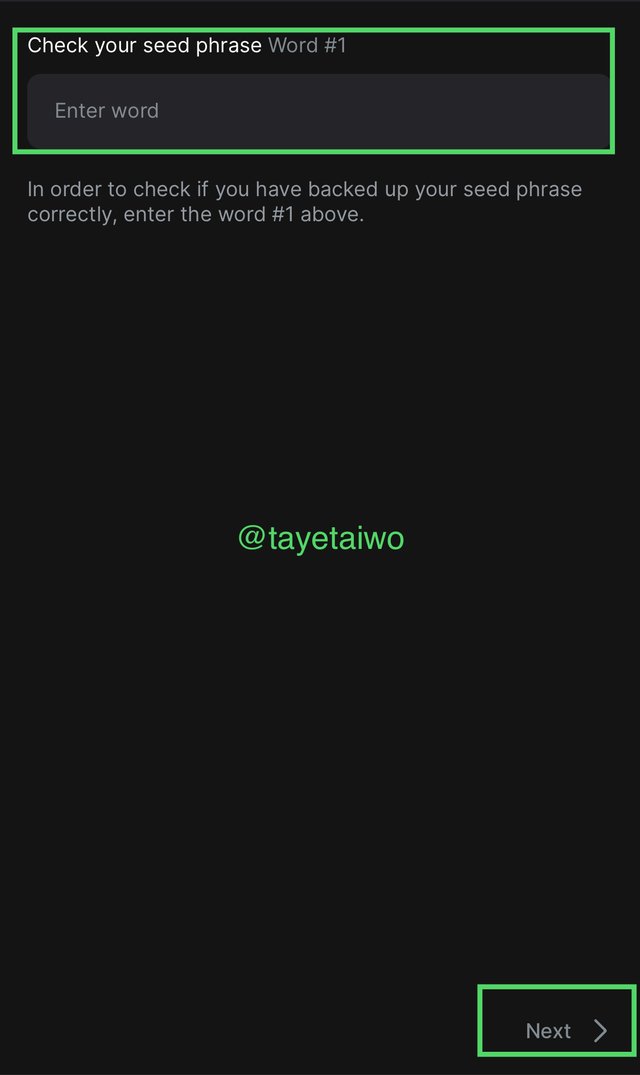
- STEP VI
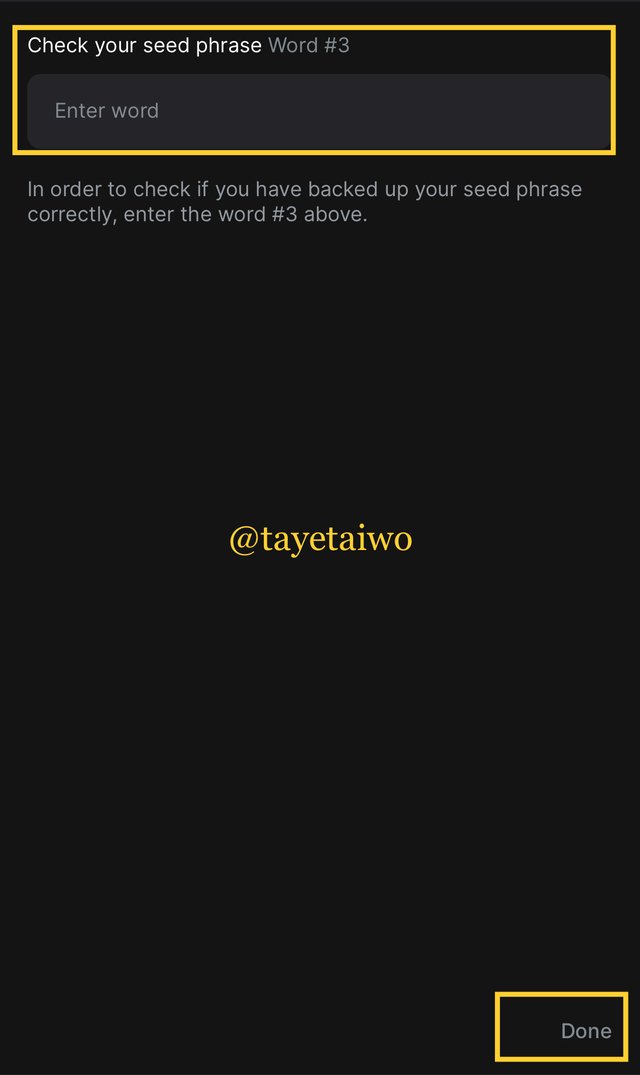
- STEP VII
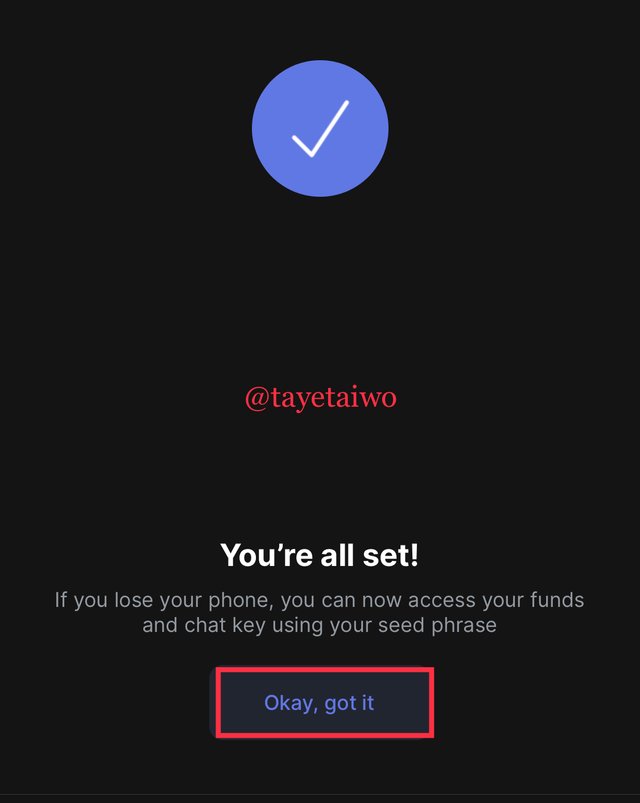
Before this page, a pop-up notification on the screen says “you will not be able to see the whole seed phrase again, are you sure?”, click on yes.
Then, this page which says “you are all set”, indicating a successful seed phrase backup. Click on “okay, got it”
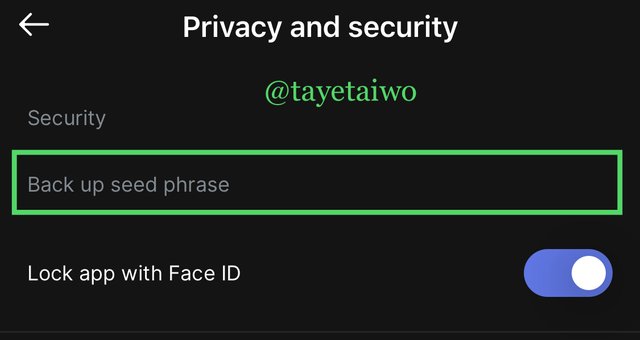

Explore all the features in the Status application. (Screenshot required).
PROFILE FEATURE:
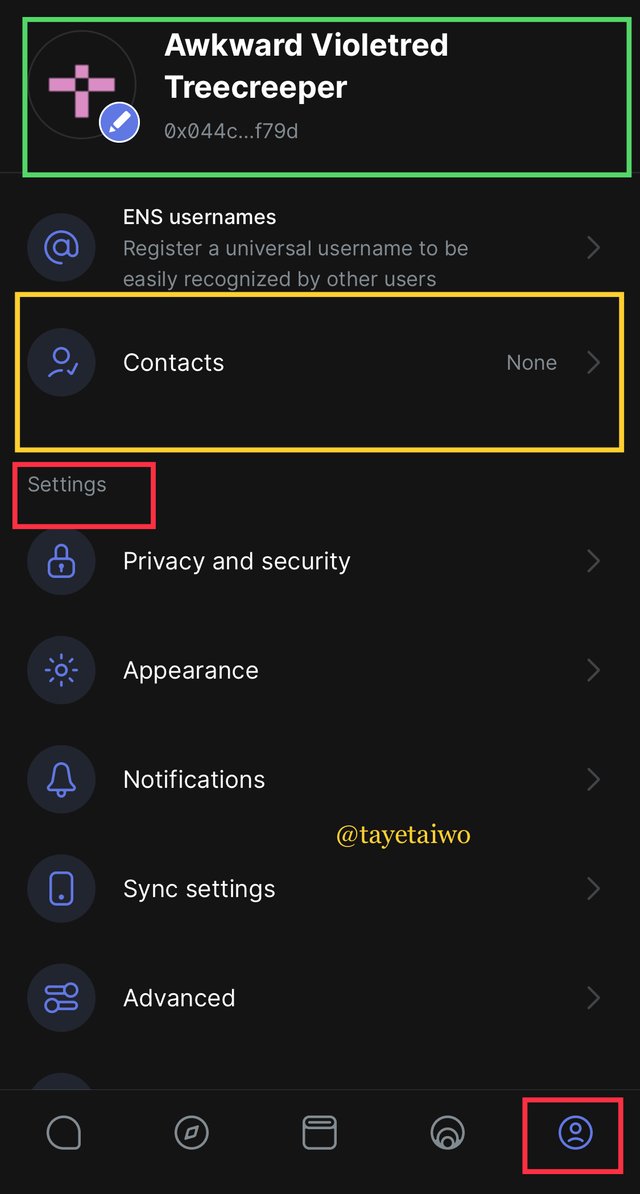
The profile detail is tracked down at the bottom right corner in status application. The profile icon is indicated with a red box in the uploaded image. The profile feature gives users the access to their chat name as indicated with a green box at the top of the screen in profile page. Also, all sort of settings can be accessed here, such as; appearance, privacy and security, notification, etc, as well as users seeing their contacts.
SHARE FEATURE:
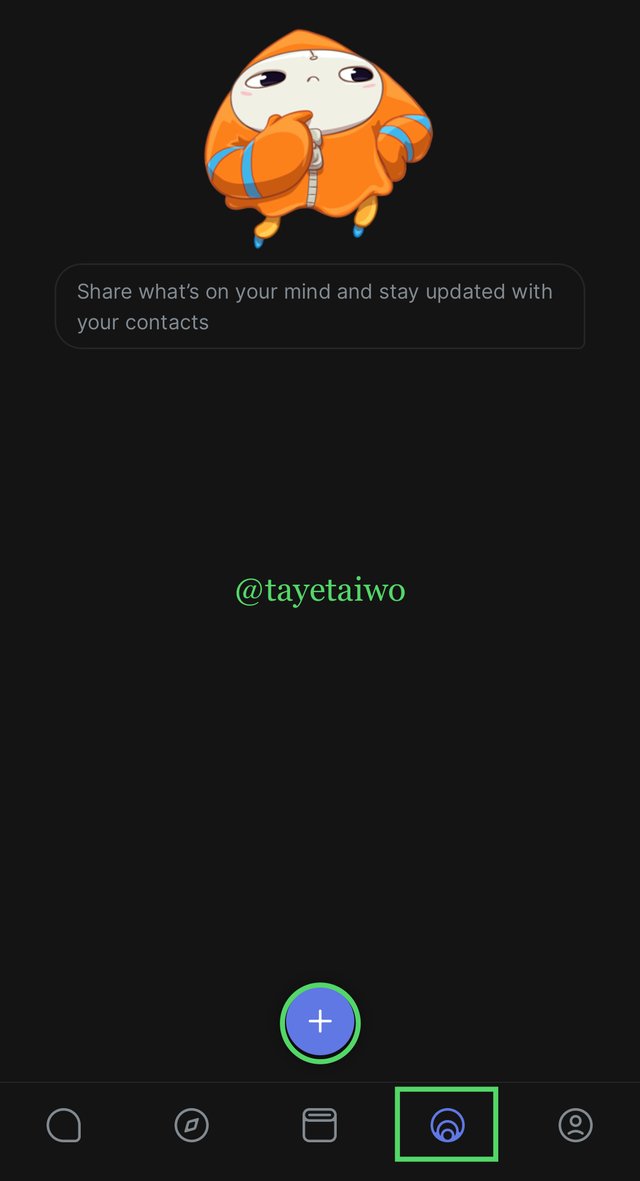
The next feature on the status appication is the share feature. This feature is used in the creation and sharing of contents, and this is done by clicking the “+” button indicated by a green circle in the image.
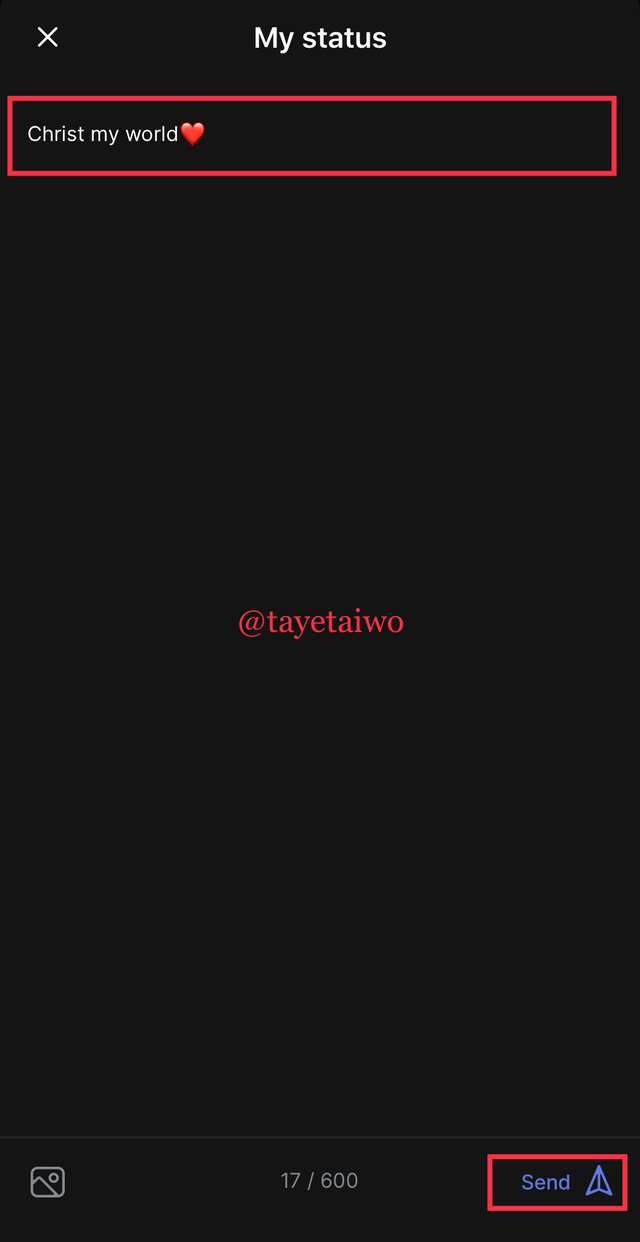
After clicking the “+” button, a page were users can update their status would appear. As we can see I wrote “christ my world” on the status update bar as indicated by a red box, after clicking the “+” button under share icon.
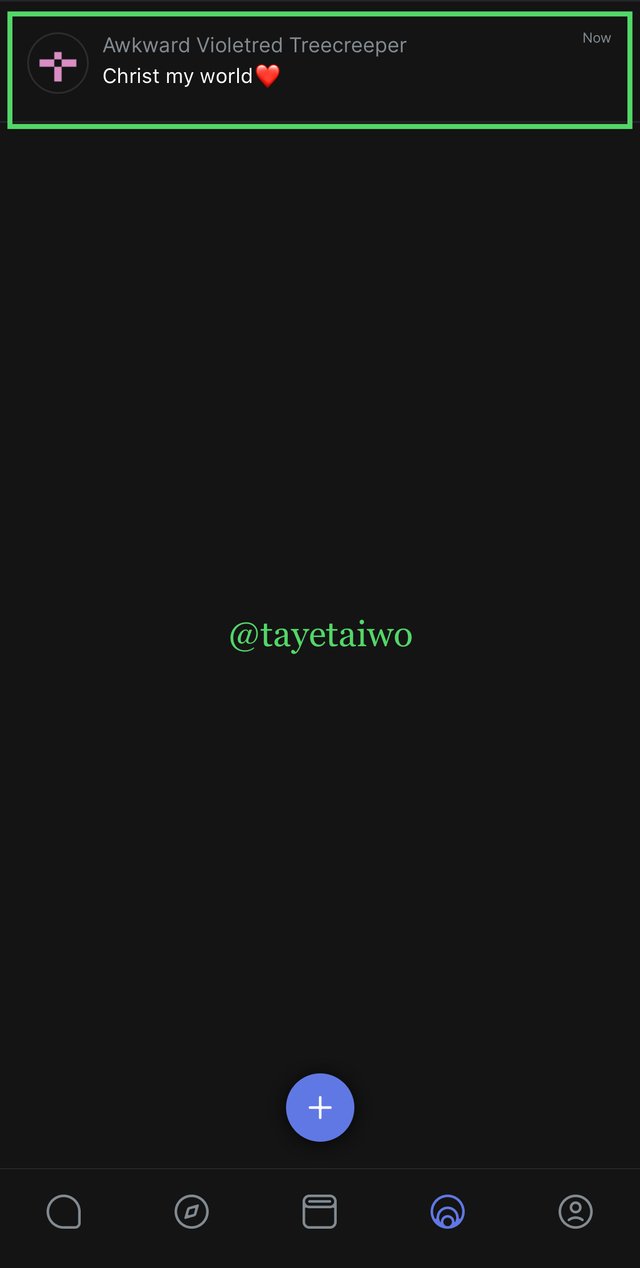
The updated status text was posted instantly on my profile as indicated by a green box, just directly under my chart username.
WALLET FEATURE:
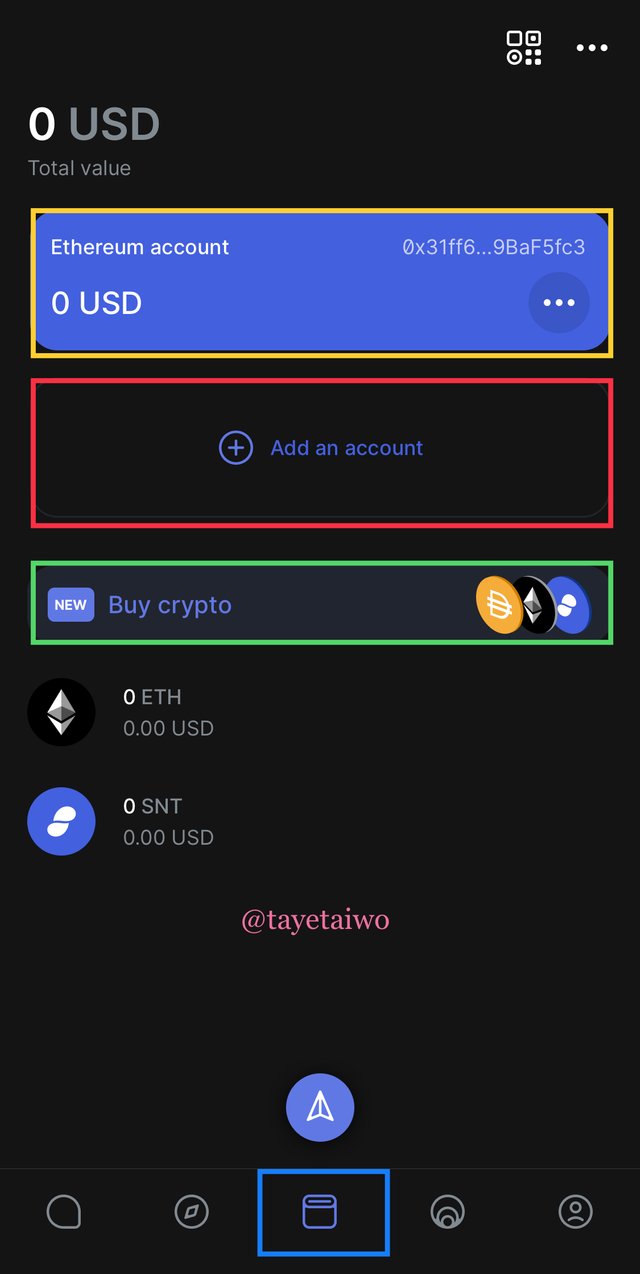
The Next essential feature on status application is the wallet. The wallet feature is located at the bottom center in status app as indicated by a blue box at the bottom of the uploaded image. This feature grants users the access to store their crypto assets on status application. According to the displayed image, My wallet is indicated by a yellow box. Aside from storing crypto assets, users can as well purchase other crypto assets through the wallet feature as indicated by a green box in the image. Users can also add a new account as indicated with a red box in the image.
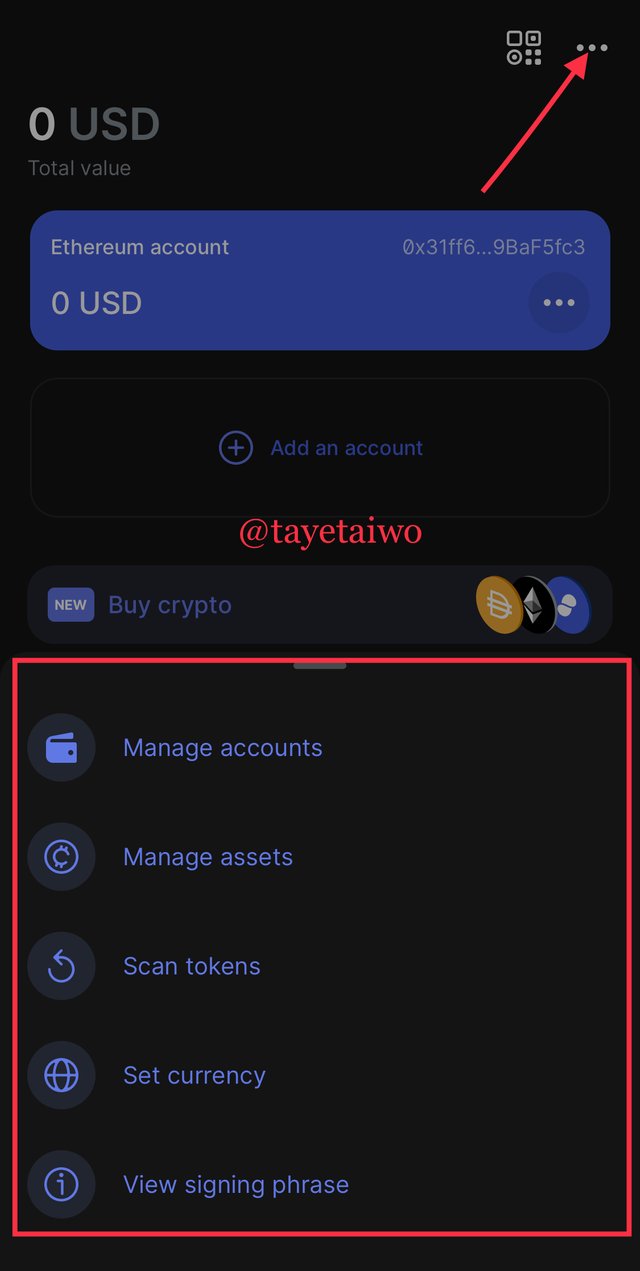
At the top right corner of the wallet page close to the scan icon, there are three dots in linear form, here we would see the following; manage account, manage asset, scan token, set currency and view your signing phrase.
WEB3 BROWSER:
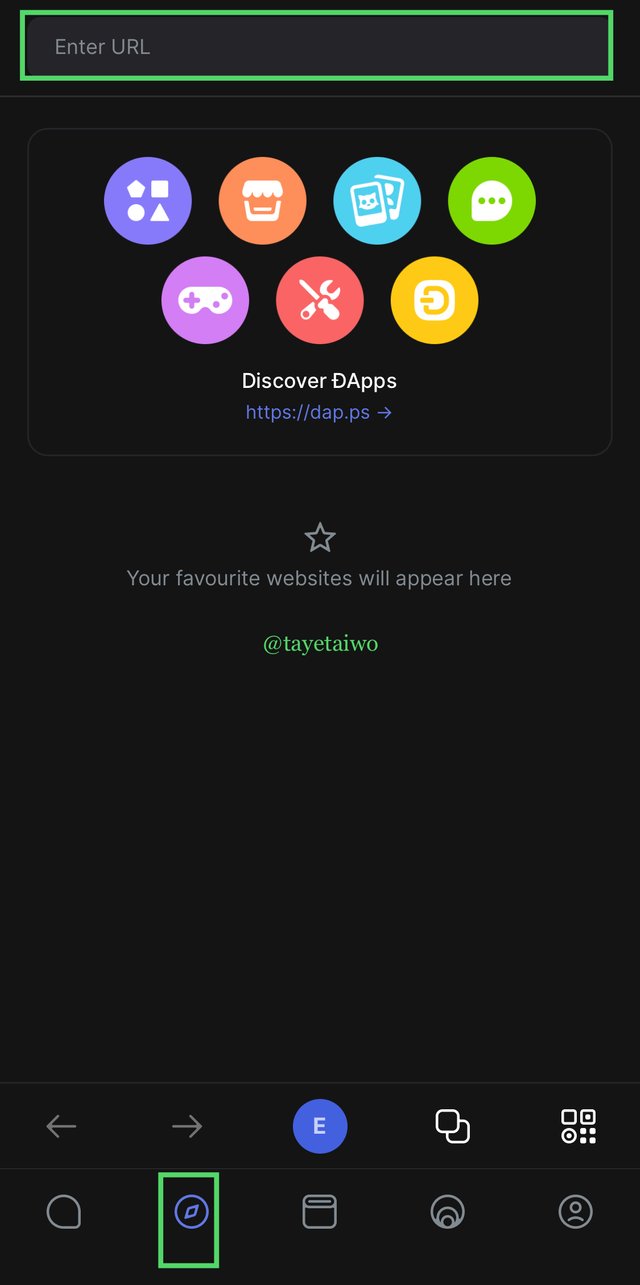
The next feature in status app is the web3 browser, the second feature/icon from the left on status. This feature gives users access to numerous DApps through the web3 browser, by inputting the URL of the dApp in the above tab provided as indicated by a green box in the image uploaded. Users are able to connect their Defi accounts to the status wallet, also allowing users transact on various Defi apps compactible with Ethereum.
CHART FEATURE:
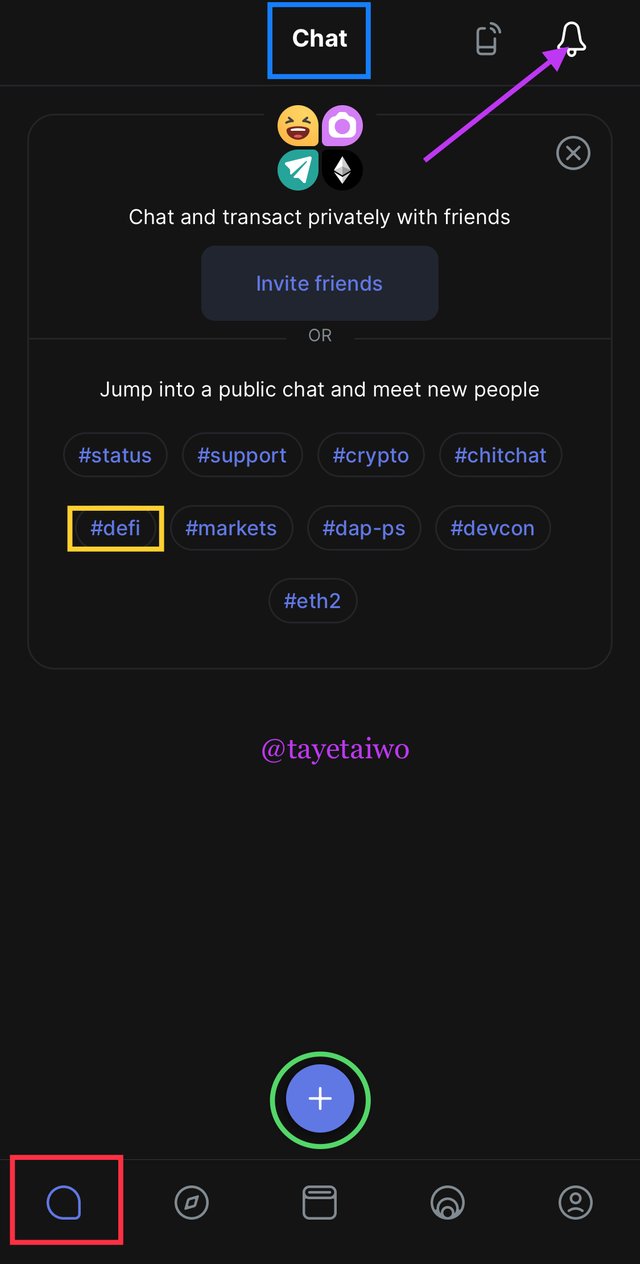
The Chat feature is meant for users to chat and interact with friends by clicking the “+” icon as indicated by a green circle under the chat section as indicated by a red box in the image. One can invite new friends as well. Notification can also be accessed on this feature by clicking on the bell-like structure as indicated by an arrow (pink in colour). Here users can as well join several public groups depending on their interest. In other to join a public group of your choice, click on any of the group just as indicated by a yellow box for “defi”.
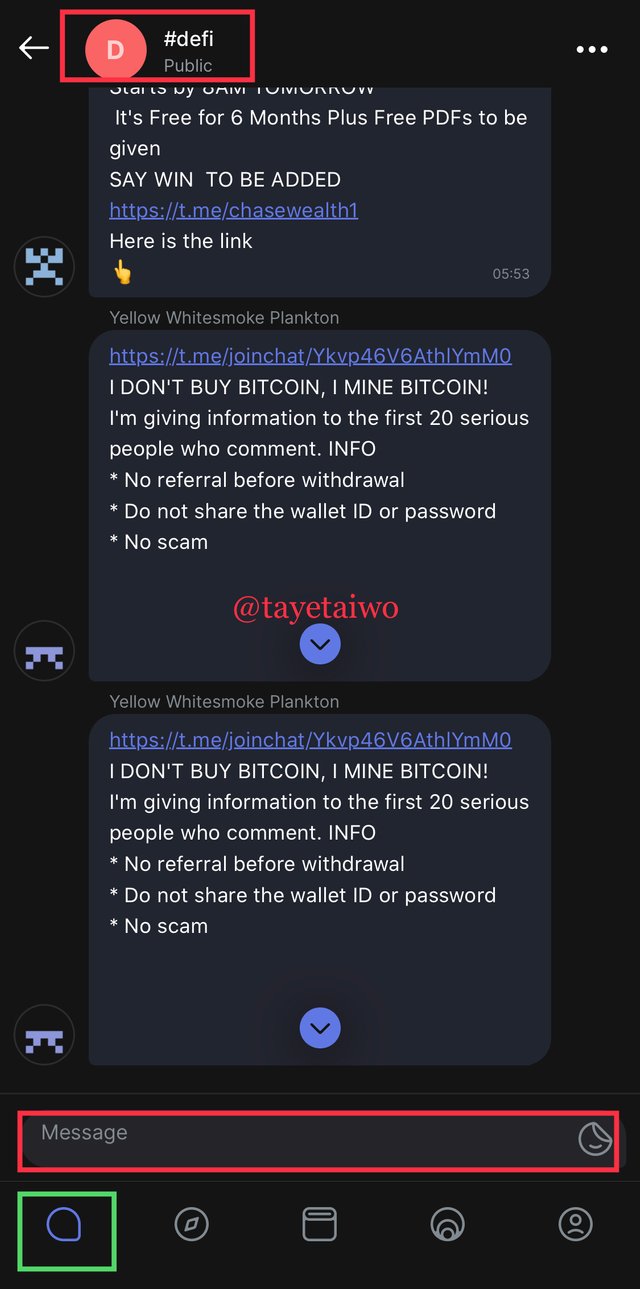
This is one of the public chat rooms, this is the “defi” chat room on status App. Users have the right to chart and associate with people all over the world of the same involvement related to the defi group.

Show how to connect the Crypto Wallet in your Status account with a DApp using Web3 Browser. (Screenshot required).
- STEP I
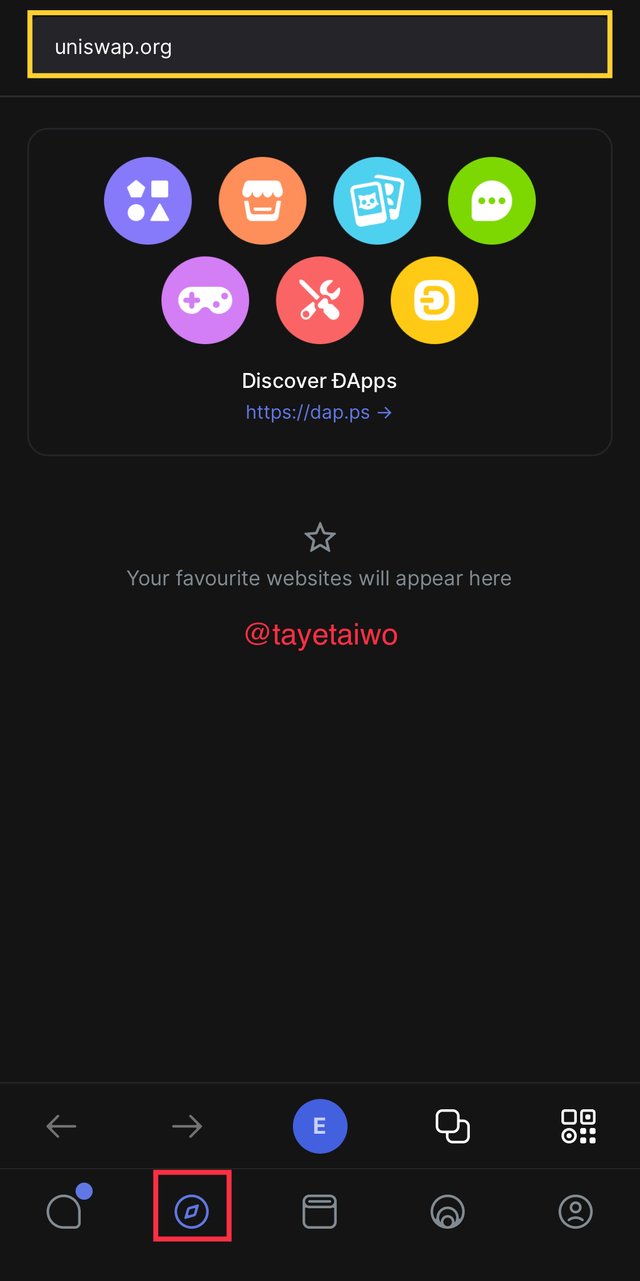
In other to connect your status crypto wallet to a DApp through the web3 browser, click on the web 3 icon at the bottom left corner of the page as indicated by a red box in the image. Input the web address “uniswap.org” on the above search bar as indicated by a yellow box.
- STEP II
After the uniswap home page must has opened, at the bottom right corner of the page, click on the three linear dots indicated by a yellow box in the image.
- STEP III
A pop up page would appear, displaying some other features on the page, click on "connect wallet" as indicated by a red box in the image.
- STEP IV
A notification page would pop-up on the screen informing that “uniswap would like to comment to ethereum wallet”. Click on "allow" as indicated with a green box in the image.
The image shows the successful connection of my wallet to uniswap Dapp as indicated by a yellow box.

Create a new Crypto Wallet account in the Status app. (Screenshot required).
- STEP I

In other to create a new crypto wallet account on status platform, click on the wallet feature as indicated by a yellow box below the center of the page. Click on "Add an account" as indicated by a green box in the image.
- STEP II
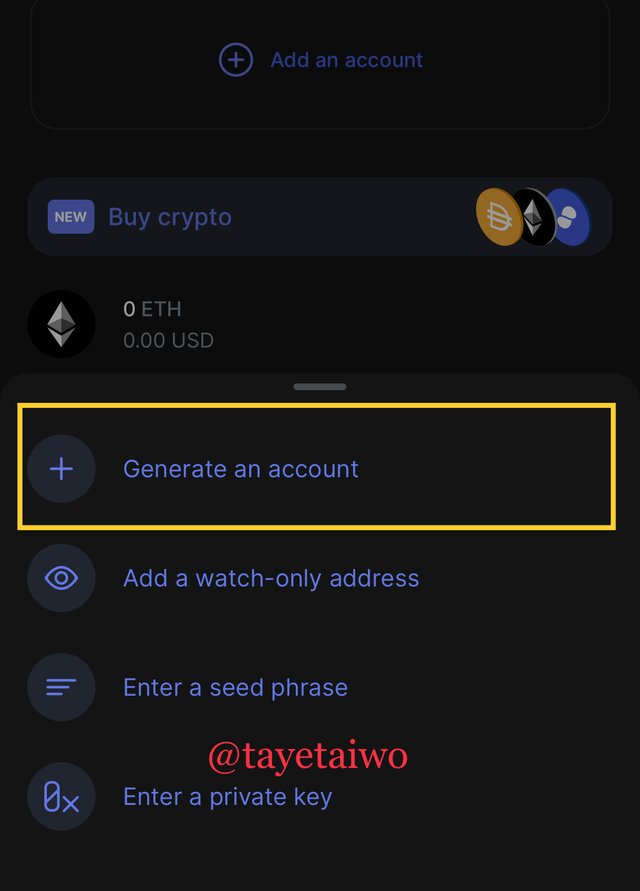
A pop-up page would appear, with four (4) different options, click on "generate an account" as indicated by a yellow box.
- STEP III
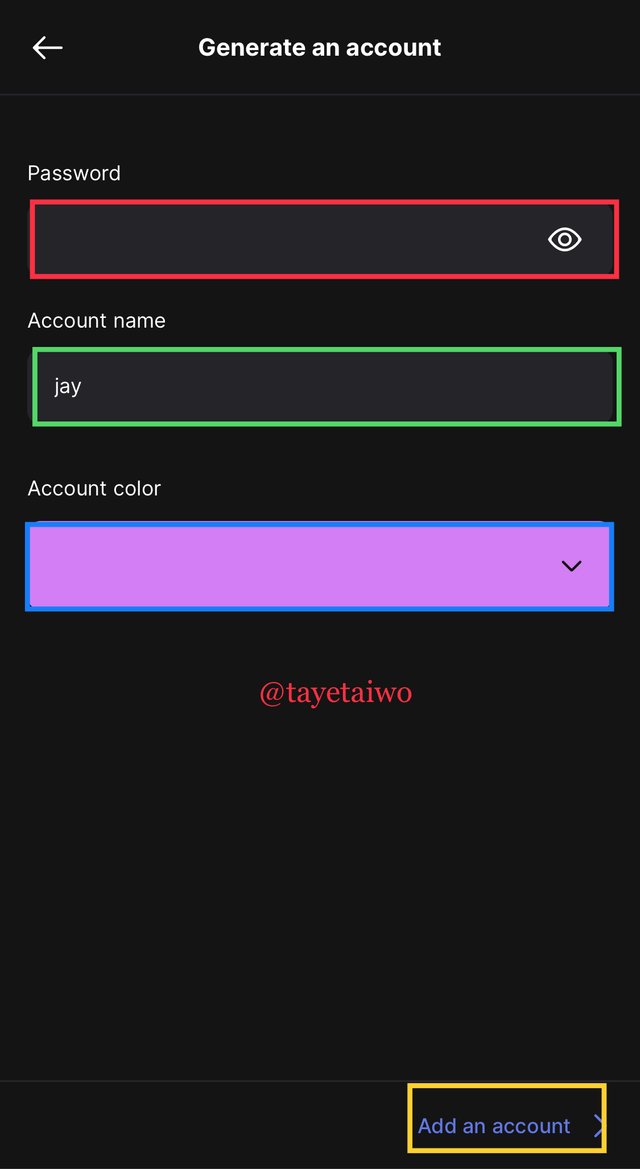
The “generate account page” would open, here, I entered my password and the name I wish to give my account, I also changed the color of the newly generated account to pink in other to differentiate it from the already existing account. After that I clicked on "Add an account" as indicated at the bottom right corner by a yellow box.
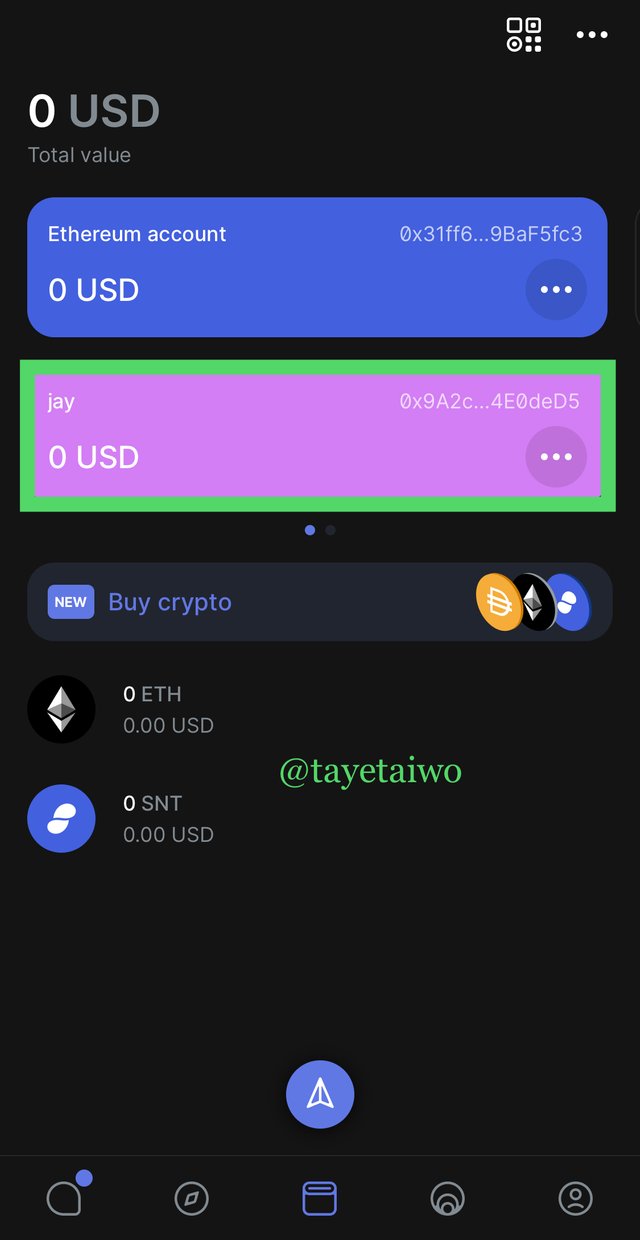
The image shows the successful creation of a new account on status app platform. As we can see the newly created account with a pink Colour indicates by a green box.

Show how to connect a separate Crypto Wallet to the Status app. (Screenshot required).
For this question I would be connecting my trust wallet to the status platform, and this are the following steps I took.
- STEP I
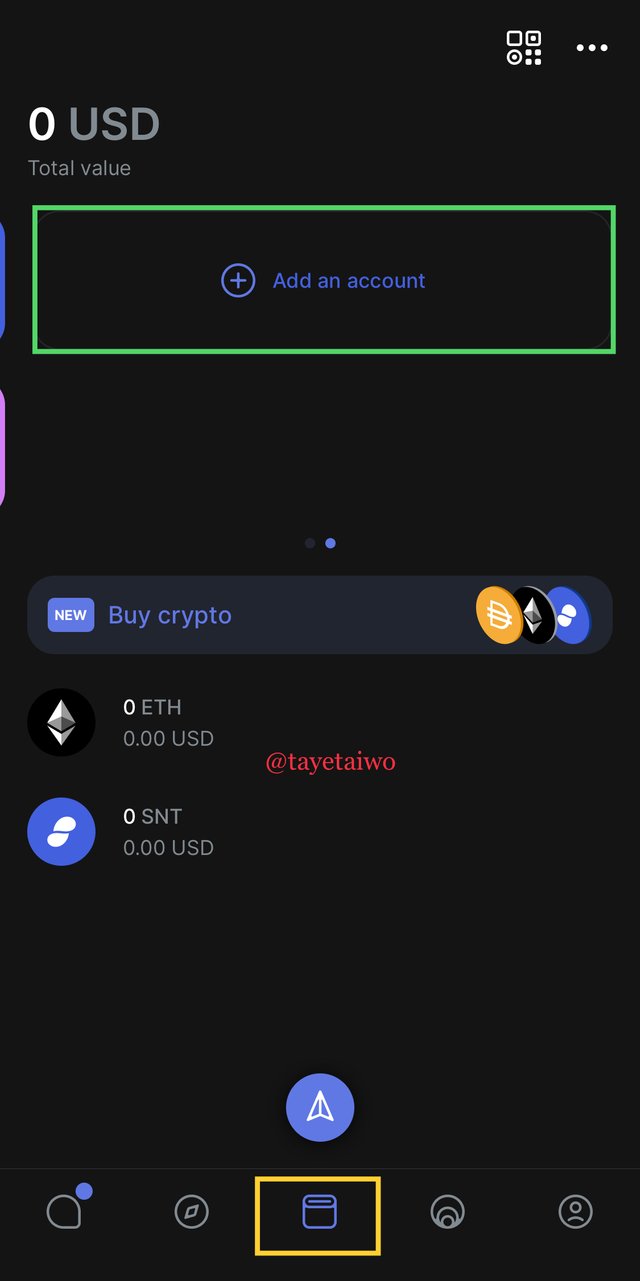
Login to your to my status account, go to the wallet features indicated by a yellow box at the down center of the page. Click on “add an account” which is indicated by a green box.
- STEP II
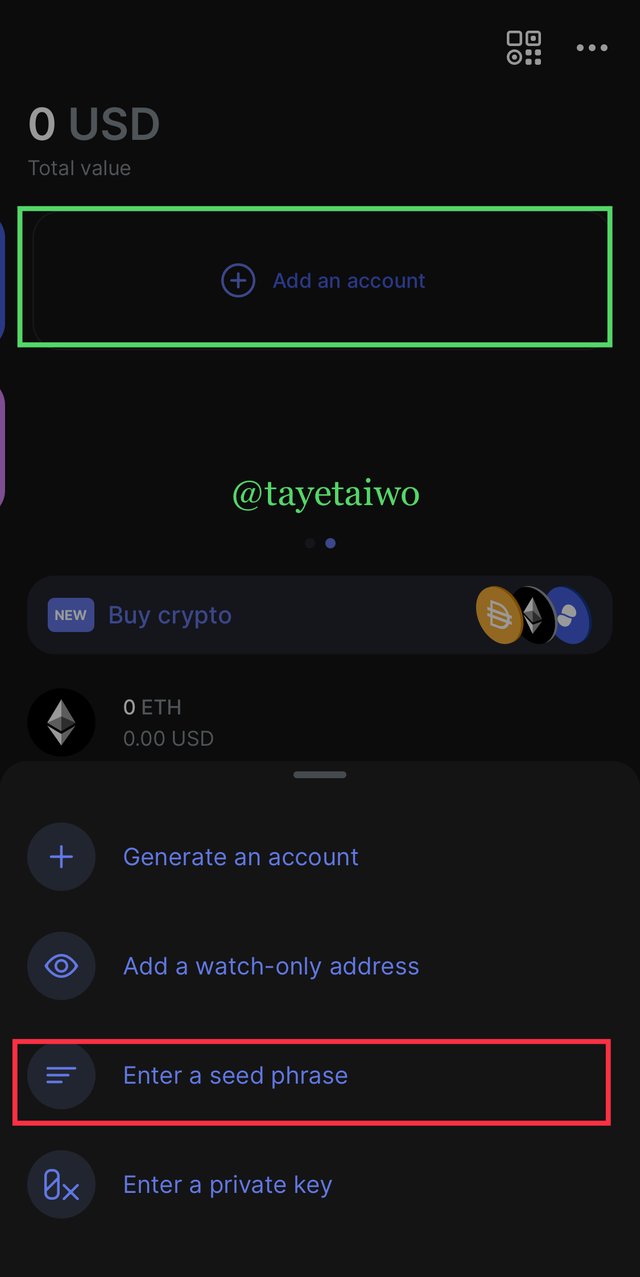
Next, a pop-up page would appear displaying four different ways an account can be managed, either generated or added to status platform. In other for us to add an external wallet to the status app, the simplest method is to import the externals wallet through its “seed phrase”, just like the way I imported my trust wallet account. Then Click on "enter a seed phrase" as indicated by a red box in the image.
- STEP III
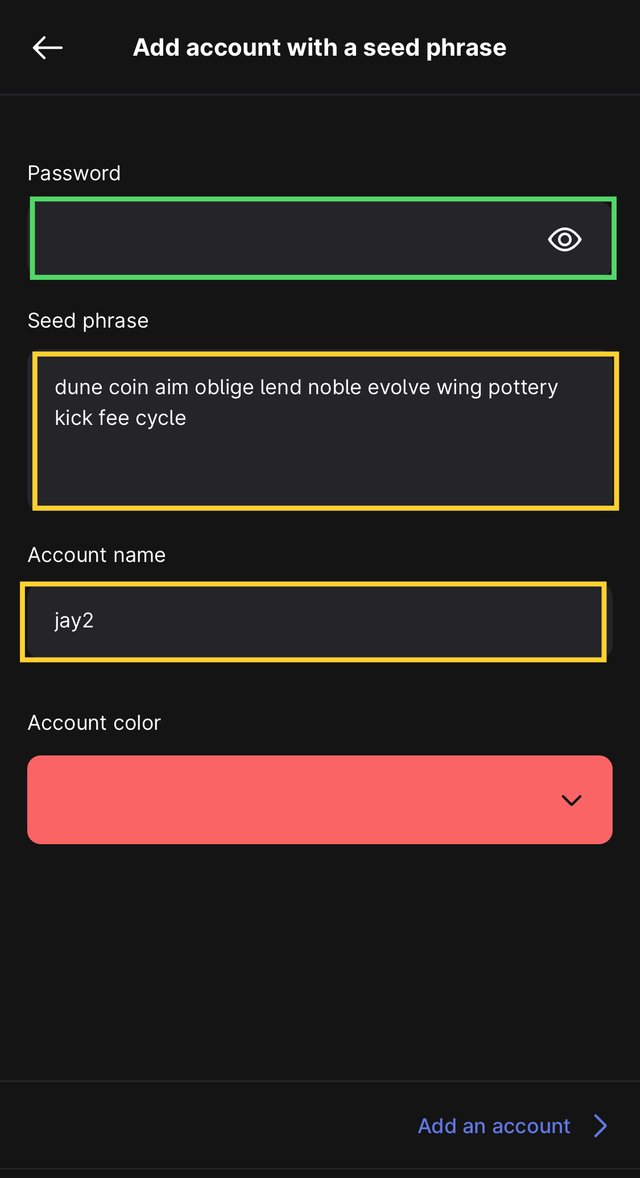
The next page is were you would be asked to add an external account using its seed phrase.
In the first box provided as indicated by a green box, Is the space where you input your password.
The second box which is indicated by a yellow box is the space to input the external wallets seed phrase, I then added my trust wallets seed phrase.
The third box is to give the external wallet a name, in other to differentiate it from the other wallets, then I choose a Colour which depicts the account in question. After that, I clicked on "add an account" to proceed.
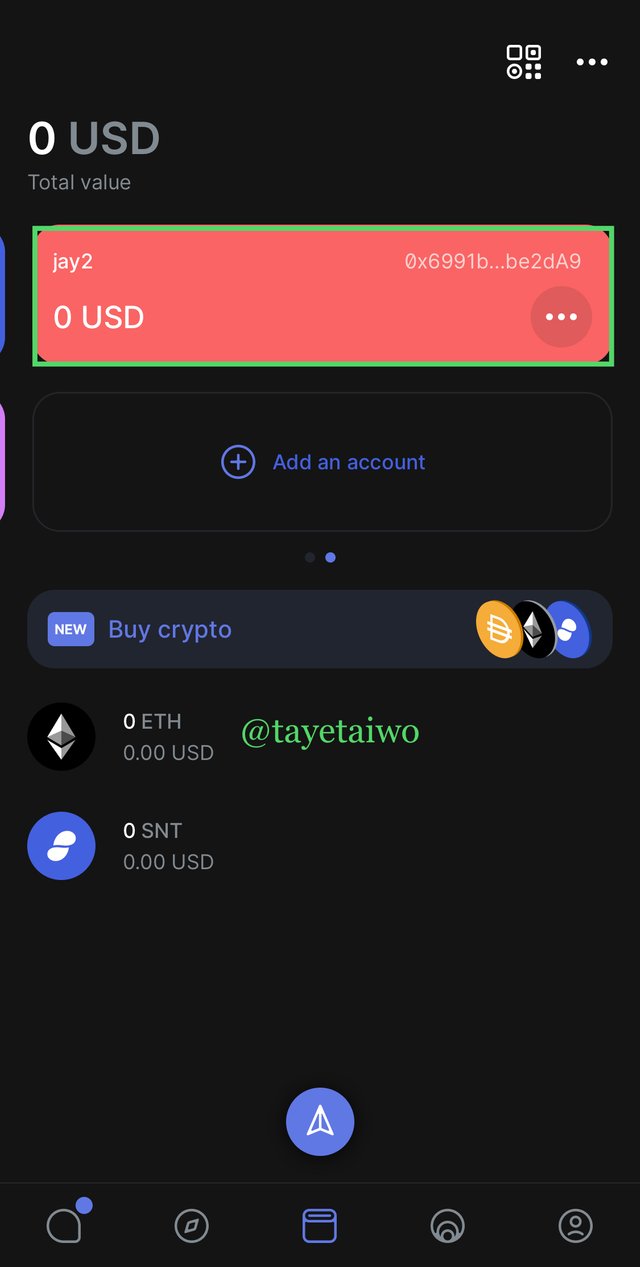
My external account has been added successfully as indicated by a green box with the address link at the top right corner inside the indicated box.
Observing the contact address in other to be sure that the match. We could see that the contact address shown in this image starts with “0x6991b.... be2dAy”. Then I logged into my trust wallet application to confirm their similarities.
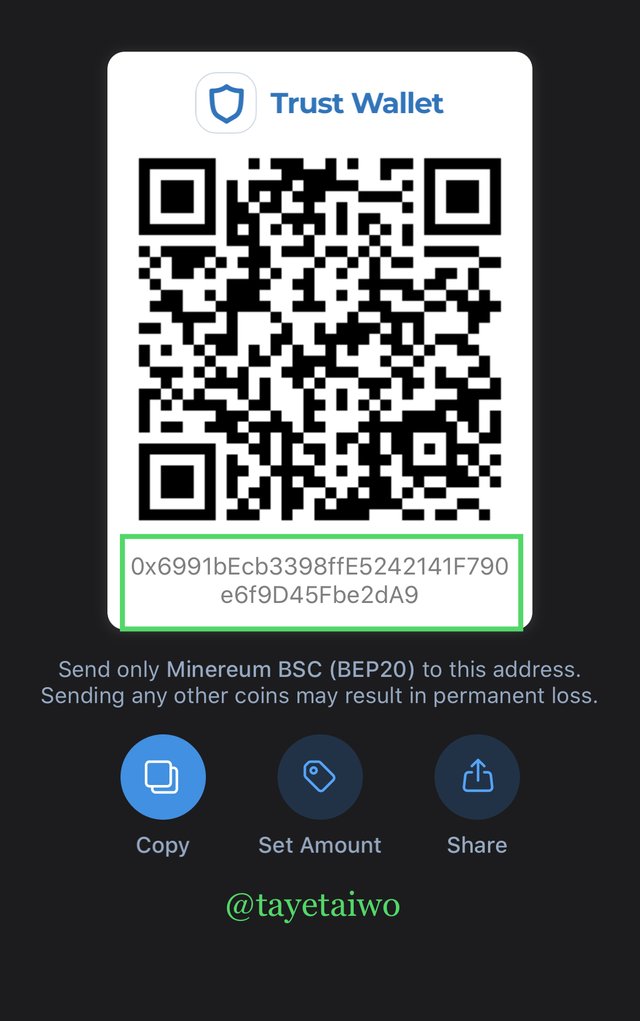
Checking the similarities with my trust wallet app, I notice that the two contact address are the same as indicated by a green box. This means the successful linking of my external wallet to status platform.

Status is a decentralized blockchain application which uses the P2P messaging system that allows users to create and send a message to another person without the interference or need of an intermediary or third-party.
The invention and development of the P2P messaging app “status” has brought freedom and safety to users who wishes to remain anonymous, which also brings freedom in communication.
Unlike the conventional messaging Applications, there are limits to discussing and publishing some contents, which if abused can lead to the blocking of the defaulter account.
So I would say that with the invention and knowledge of status decentralized messaging app, communication has come to a greater height with freedom and trust in communication. In this article I explained with detailed examples and images the delivery mechanism on status messaging App.
Also showing how an account can be created and added on the status App while exploring its features.
Lastly, I clarified the steps in connection of my status crypto wallet to DApps through the web3 browser which is functional on status platform.
I also proved with significant images how an account can be generated from the status platform and how an external account can be added to the status platform.
Special thanks to professor @wahyunahrul for this intriguing lecture.

All unsourced images are properties of the author and gotten from the status application.

CC:
